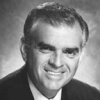I was honored to participate in a ceremony June 12 at Eureka College that honored Ronald Reagan, and I'd like to share some of the words I shared with the crowd that day:
"We have all read and heard well-deserved praise of Ronald Reagan. In many of the speeches and articles that honor him, he is called 'The Great Communicator.' In fact, this seems to be the title that history will bestow on President Reagan.
"And who can deny that he was the greatest political orator of our time? His warm, friendly tone; his flawless delivery; his perfect timing; that irresistible grin, even the way he held his head on that slight angle as he spoke-all of it contributed to making his speeches memorable.
"But if we remember Ronald Reagan only because of his great communication skills, I think we do him a disservice. Ronald Reagan was a great communicator because he had something great to communicate. He didn't just speak to us-he spoke for us, for our national ideals and values.
"As a speaker, he knew that eloquence without values is demagoguery. He knew that beautiful words can often hide ugly beliefs. And he knew that values are not something you throw into a speech at the last moment-values must inspire and shape every public utterance.
"And in his 1980 acceptance speech, he told us exactly what those core values are. He spoke of 'a community of shared values of family, work, neighborhood, peace and freedom.'
"And throughout his presidency, no matter what topic he spoke of, those basic values were the real message.
o He believed strong families are the very heart of our society.
o He believed peace is achieved not by noble sentiments but by being strong enough to keep the peace, and wise enough to seek peace.
o And about freedom, he had one simple, unforgettable thing to say: 'Freedom works.'
"During the 20th century, all kinds of totalitarians said that freedom doesn't work. They sneered at our freedoms. They said democracy is too chaotic, too weak, too undisciplined. But fascism and communism are dead, eloquent testament to the power of democratic freedom.
"Today, the terrorists of the 21st century tell us our freedom is decadent, undisciplined, immoral. They sneer at us as luxury-loving, weak, and ready to fall.
"But if Ronald Reagan were among us today, I believe he'd tilt his head to the side, grin, and say in his typical fashion: 'Well, the terrorists are wrong. Terrorism destroys. But freedom builds. Terrorism is a dead end. But freedom works. Terrorism will fail. Freedom will prevail.'
"But-and here is the true wisdom of Ronald Reagan-he knew that freedom cannot work, cannot prevail, unless it is guided by values. He knew that freedom without transcendent values will perish. He knew that the free market system, the greatest device in history for fighting poverty, must have a firm foundation of moral values if it is to work for all of us.
"These were the ideas Ronald Reagan communicated. And do you know where he learned these ideas? At Eureka. In Tampico and in Dixon. In Illinois. He learned common sense and common decency among Illinois friends and neighbors and teachers who knew and loved Dutch Reagan. He retained that wide and deep streak of heartland common sense all his life.
"There's one other thing I want to say about President Ronald Reagan. He was a gentleman. Now there's a word that may seem out of place when speaking of the rough and tumble world of politics. But in Ronald Reagan's case, it mattered very much. He could be tough, but he was never mean. In Washington, he had fierce adversaries, bent on destroying his presidency, but he never treated them as enemies. He knew who he was, and he knew where he came from, so he didn't have to affect macho poses.
"It so happens that for many years I had the privilege of working for another great Illinois leader who embodied that same virtue of civility: Bob Michel. For many years, Bob graced the congressional seat it is my honor to currently hold. I might add that as Minority Leader of the House, Bob helped President Reagan very much, because they shared the same values. Bob taught me by example that politics can be rough, but it should never be dirty. He taught me that in the democratic process, fighting hard for what you believe in doesn't mean forgetting your opponent's essential humanity.
"Think of it: Ronald Reagan and Bob Michel. Each was born and educated in Illinois. Each was a great, hard-fighting political leader. And each was a believer in the virtue of civility.
"Maybe it's something in our Illinois water. If so, we should bottle it and send a case or two to Washington.
"And so, as we hear tributes to the Great Communicator, let's remember that in the final analysis, it was what Ronald Reagan said, and not just how he said it, that mattered. He truly believed that ideas have consequences. He truly believed that freedom works. He truly believed in peace through strength. And he truly believed that God has indeed blessed America, this shining city on a hill, not because we are better than everybody else, but because when we serve great American values, we can do great and good things together." IBI

